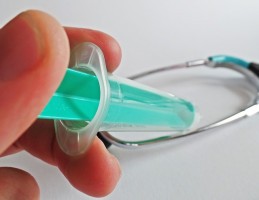
An experimental therapeutic cancer vaccine induced two distinct and desirable immune system responses that led to significant tumour regression in mice, report investigators from the National Institute of Allergy and Infectious Diseases (NIAID), part of the National Institutes of Health.
The researchers found that intravenous (IV) administration of the vaccine boosted the number of cytotoxic T cells capable of infiltrating and attacking tumour cells and engaged the innate immune system by inducing type I interferon.
The innate immune response modified the tumour microenvironment, counteracting suppressive forces that otherwise would tamp down T-cell action. Modification of the tumour microenvironment was not seen in mice that received the vaccine via needle injection into the skin (subcutaneous administration).
Dubbed “vax-innate” by the scientific team, the approach achieves an important goal in the quest for more effective immunotherapeutic vaccines for cancer. The study demonstrates that IV vaccine delivery enables and enhances T-cell immunity by overcoming tumour-induced immunosuppressive activity.
The researchers say the candidate vaccine might also be given intravenously to people who have already received tumour-specific T cells as a therapy. It also could improve tumour control by increasing the number of T cells and altering the tumour microenvironment to make them function better, the researchers note.
The experimental vaccine, SNAPvax, was designed by Robert Seder, M.D., and colleagues at the NIAID Vaccine Research Center (VRC) together with collaborators from Vaccitech North America, a clinical-stage biopharmaceutical company in Baltimore, Maryland. Vaccitech announced plans to advance the SNAPvax platform for use in treating human papillomavirus-associated cancer in 2023.
Source: NIH/National Institute of Allergy and Infectious Diseases
We are an independent charity and are not backed by a large company or society. We raise every penny ourselves to improve the standards of cancer care through education. You can help us continue our work to address inequalities in cancer care by making a donation.
Any donation, however small, contributes directly towards the costs of creating and sharing free oncology education.
Together we can get better outcomes for patients by tackling global inequalities in access to the results of cancer research.
Thank you for your support.